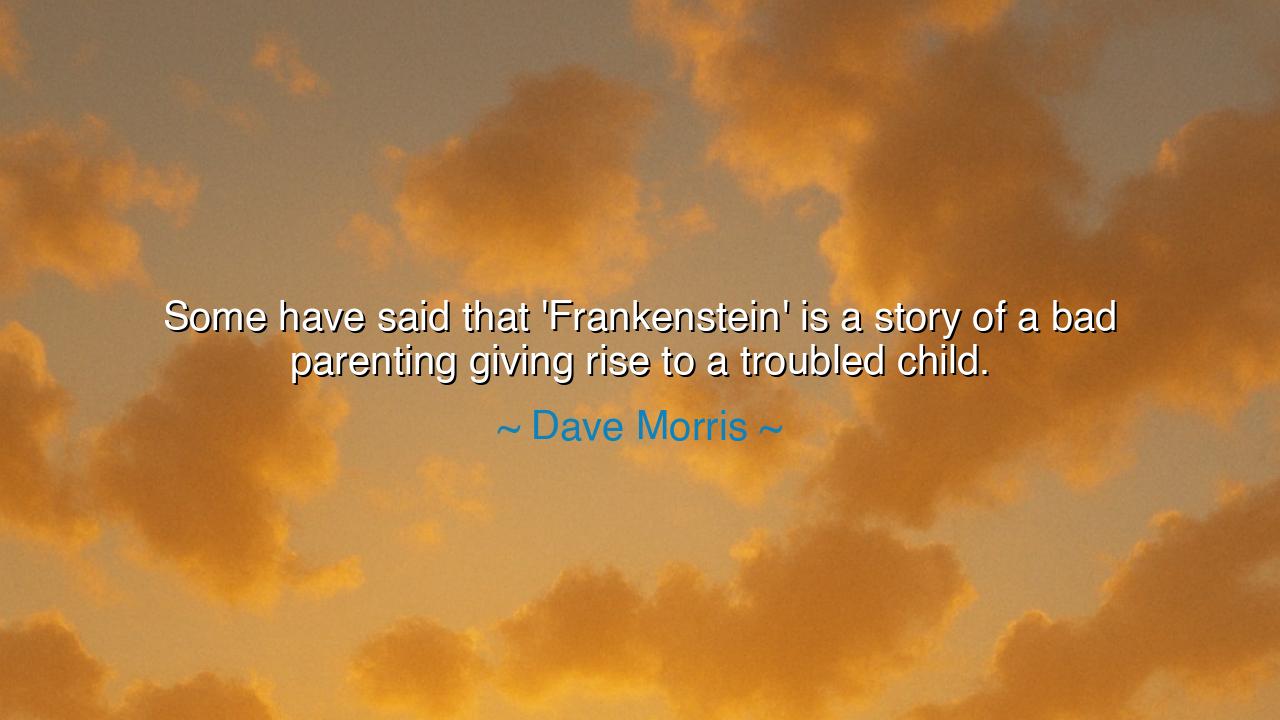
Some have said that 'Frankenstein' is a story of a bad parenting
Some have said that 'Frankenstein' is a story of a bad parenting giving rise to a troubled child.






Hearken, O seekers of wisdom, to the words of Dave Morris, who draws our attention to the cautionary tale within Mary Shelley’s Frankenstein—a narrative often interpreted as a reflection on parenting and its profound consequences. He observes that some see the story as a parable of bad parenting giving rise to a troubled child, where neglect, absence, and moral abdication shape not only the behavior but the very soul of the young being. In this reflection lies an eternal truth: the bonds between parent and child, whether forged or fractured, wield a power that can uplift or devastate.
The origin of this insight rests in Shelley’s own creation, wherein Victor Frankenstein, consumed by ambition and curiosity, abandons the being he has brought into existence. The creature, left to navigate the world without guidance, love, or moral instruction, experiences rejection and isolation, and its suffering manifests in anger, despair, and violence. Morris’ interpretation highlights that parenting—broadly conceived as the act of care, nurturing, and moral stewardship—is not solely the provision of life, but the responsible cultivation of character and conscience.
History offers poignant reflections of this truth. Consider the tragic life of Napoleon Bonaparte, whose early years were marked by both discipline and distance. Though trained and educated, the absence of warmth and emotional support in certain periods of his youth contributed to a psyche both ambitious and vulnerable, capable of great leadership yet prone to tyranny. Like Frankenstein’s creature, Napoleon’s upbringing illustrates that the neglect of guidance and empathy can shape even the most gifted into tumultuous beings, reminding us of Morris’ reflection on bad parenting.
The emotional resonance of this lesson is profound. Parenting is not merely the provision of sustenance, instruction, or protection—it is the weaving of a moral and emotional framework. Shelley’s tale, as Morris observes, portrays the deep consequences when this framework is absent. The child, or the being entrusted to our care, is not inherently troubled; rather, neglect and abandonment seed confusion, despair, and misdirected anger. Here lies the heroic task of the guardian: to accompany, instruct, and love with unwavering attention, recognizing that presence and empathy shape destiny.
In practical terms, this story teaches that abandonment and neglect, whether physical, emotional, or moral, leave enduring scars. Guardians must engage with intention, providing not only care but moral guidance, affirmation, and consistent attention. Historical examples, such as the upbringing of the great philosophers of the Renaissance, demonstrate that attentive mentorship and parental support cultivate not only knowledge but virtue and resilience. The contrast with Shelley’s narrative underscores the peril of absent or indifferent care.
Morris’ observation also carries a broader social dimension: societies, like parents, shape the character and destiny of those within them. Just as Victor Frankenstein failed in his moral responsibility, communities and institutions that neglect the young risk creating conditions of alienation, anger, and moral turbulence. From this lens, the tale of Frankenstein becomes a mirror, reflecting the consequences of neglect in all forms, urging vigilance, compassion, and ethical responsibility in all who influence young lives.
From this understanding arises a practical lesson: embrace parenting as a sacred and enduring responsibility. Provide guidance, love, and moral instruction. Attend to the emotional and psychological needs of the young. Recognize that absence, neglect, or indifference can transform potential into peril, whereas presence, care, and empathy nurture virtue and resilience. Let each interaction be deliberate, rooted in the understanding that character is molded as much by attention and guidance as by inherent talent or circumstance.
Thus, the teaching of Dave Morris endures: bad parenting can give rise to troubled children, as illuminated in Shelley’s Frankenstein, and the consequences of neglect ripple through time and life. Let all who bear the mantle of guardianship approach it with vigilance, compassion, and ethical courage. In so doing, they honor the profound responsibility entrusted to them, ensuring that those in their care grow into beings of integrity, resilience, and wisdom, rather than victims of absence, abandonment, and moral neglect.






AAdministratorAdministrator
Welcome, honored guests. Please leave a comment, we will respond soon